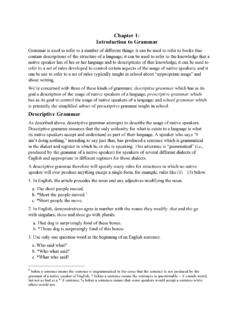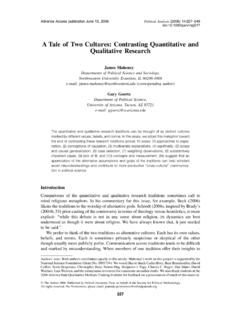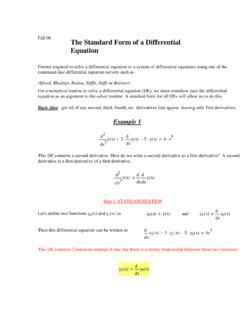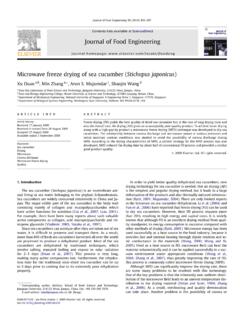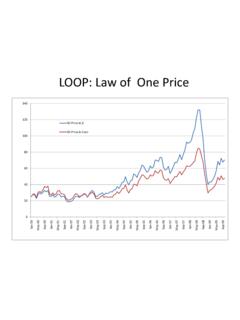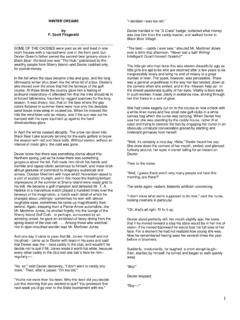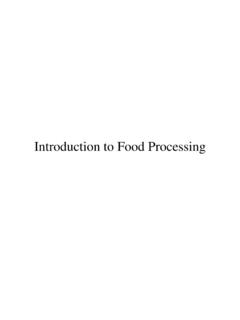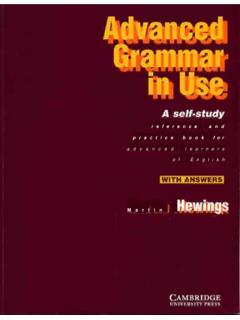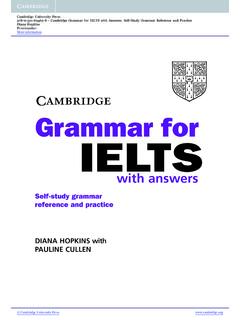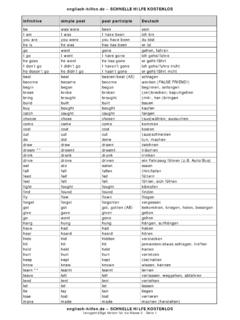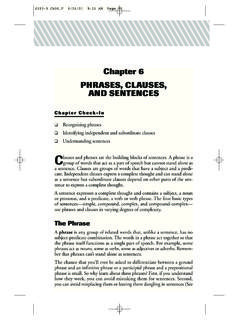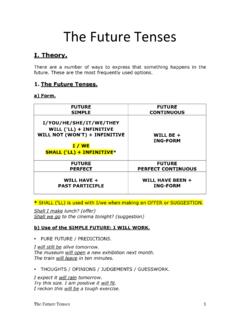Transcription of Chapter 7: Subordinate Clauses - Washington State University
1 Chapter 7: Subordinate Clauses Clauses , as we have seen, can be coordinated with each other, so that the sentence consists of a set of conjuncts. A clause can also serve other grammatical functions inside another clause: A. clause which serves a grammatical function (other than conjunct) inside another clause is called a Subordinate clause. Subordinate Clauses have specific structural features that distinguish them from main Clauses and serve a range of grammatical functions (most of which we have already discussed in considering the grammatical functions of noun phrases, adjective phrases, adverb phrases and prepositional phrases). Structures A clause is a predicate and its subject (if it has one) and any clausal modifiers and subordinating conjunctions which relate the clause to other Clauses .
2 A main clause as we have noted before is always finite -- it always has a verb which is marked for tense and agreement (where appropriate) and it can contain a modal auxiliary and its subject (if a pronoun) will be in the subject case. Many Subordinate Clauses are finite Clauses as well. 1. I said that I might go. (that I might go is a finite clause acting as a direct object in a larger clause.). 2. When she leaves the house, you should call me. (When she leaves the house is a finite clause acting as an adverbial in a larger clause.). 3. Marvin likes the woman who is helping him with the project. (who is helping him with the project is a finite clause that modifies the noun woman in the larger clause.)
3 Nonfinite Clauses Many Subordinate Clauses , however, are nonfinite Clauses . A nonfinite clause in English is distinguished by the fact that the first verb in the VP does not mark tense or agreement; it cannot be a modal auxiliary, and its subject (if there is one) is never in the subject case. There are four general types of nonfinite Subordinate Clauses -- infinitives, participles , gerunds, and verbless Clauses . (Non-finite constituents are often traditionally treated as phrases, but in most modern analyses treat them as Clauses .). Infinitives Infinitives are VPs whose first V must be unmarked. There are two kinds of infinitives: Full Infinitives: In full infinitives, the first (obligatorily unmarked) verb of the VP is preceded by to, as in 4.
4 For John to win would be amazing. 5. I expect them to leave on time. 6. Mary is working hard to make money. 7. To believe in magic requires a high level of gullibility. Full infinitives can appear with subjects as in (4) and (5) or without as in (6) and (7). Bare Infinitives: In bare infinitives, the first (obligatorily unmarked) verb of the VP is not preceded by to, as in 8. I made Sue leave. 9. The children are watching him dance. 10. They won't let me help him. In almost all cases bare infinitives have subjects; the verb help can occur with subjectless bare infinitives. In both kinds of infinitives, the subject (if there is one) is in the object case, so a finite version of the Subordinate clause in (9) would be He dances, but the infinitive form has an object case subject him and the verb doesn't mark tense or agreement -- it is obligatorily unmarked.
5 It is perfectly possible to say 11. They want him to be able to look after himself. but 12. *They want him to can look after himself is ungrammatical, because modal auxiliaries cannot appear in infinitive VPs. Infinitives can appear in different aspects and voices, so 13. I expect to be working tomorrow. (Progressive Active). 14. Marge wanted to have left already. (Perfect Active). 15. The teachers expected us to have been working for the last hour. (Perfect Progressive). 16. I want to be honored by my peers for my brilliant discoveries. (Simple Passive). 17. I want my peers to honor me for my brilliant discoveries. (Simple Active). The subject of an infinitive is always in the object case if it appears all.
6 Bare infinitives always have subject; full infinitives sometimes have overt subjects and sometimes don't, depending on the structure of the rest of the sentence. So 18. I want him to leave. (him is the subject of to leave). 19. I want to leave. (no subject for to leave). 20. I made him leave. (him is the subject of leave). 21. *I made leave. participles Participle Clauses are Clauses in which the first verb in the VP is a participle. As we already know, participles are of two kinds: present or -ing participles and past or -en/ed participles . Present participle and past participle are, in fact, the traditional names, but they are quite misleading since neither participle provides any information about tense, so in The man covered with paint is decorating the living room, covered with paint is a past participle clause, but it isn't set in the past ; in The general leading the rebel forces was George Washington , leading the rebel forces is a present participle, but it isn't set in the present.
7 -en/ed participles are sometimes also called passive participles (presumably because the form is used in passive VPs, as well as in perfect VPs); this label is less misleading since -en/ed participle Clauses are always passive in sense, while -ing participles can be active or passive. 22. The contestant knowing the most answers will win the 23. The victim splattered with blood stood helpless. 24. While being treated for his injuries by the intern, Charley talked to me about his accident. -en participle Clauses never show variation in aspect, but -ing Clauses can be perfect or perfect progressive, as well as simple. 25. Having sat here all day, Evelyn was completely bored.
8 26. The performers were exhausted, having been singing for hours. As with other nonfinite Clauses , participles do not mark tense or agreement and cannot contain modal auxiliaries. participles are always used as modifiers or adverbials. Gerunds Gerund Clauses are Clauses in which the first verb in the VP is a gerund, an -ing form. The subject of a gerund may be omitted or may appear in either objective case or possessive, but it can never be in the subject case. 27. I was surprised at them/their losing the race. 28. I was surprised at losing the race. Like infinitives and -ing participles , gerunds can appear in various aspects and voices. 29. I was surprised at having lost the race.
9 (Perfect). 30. They asked me about him/his having been meeting with known felons. (Perfect Progressive). 31. Omar is pleased at being given the "Student of the Year" award by his classmates. (Passive). 32. Having been attacked by bears at the zoo convinced me not to visit there any more. (Perfect and Passive). Verbless Clauses Verbless Clauses are, as you might expect, Clauses that appear to have no verbs. For example, in (33) - (36) the underlined constituents act just like Clauses , but have no verbs. 33. Though afraid of bears, Oliver was still willing to go to Yosemite. 34. Those children, while nice enough, can't be trusted to do the right thing. 35.
10 Unhappy with the school, those parents threatened to withdraw their children. 36. Mary solved amazing mathematical problems, while still a child. Notice that these Clauses all act like have subject complements and a missing verb be and a subject the same as the subject of the clause which contains them. So (33) could also be expressed as 37. Though he was afraid of bears, Oliver was still willing to go to Yosemite. These Clauses are quite similar to adverbial participle Clauses -- so the participle clause in (38). bears a striking resemblance to the finite clause in (38). 38. While lying in wait for his victim, Jack the Ripper played with his knife. 39.

